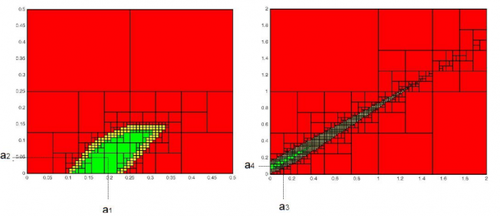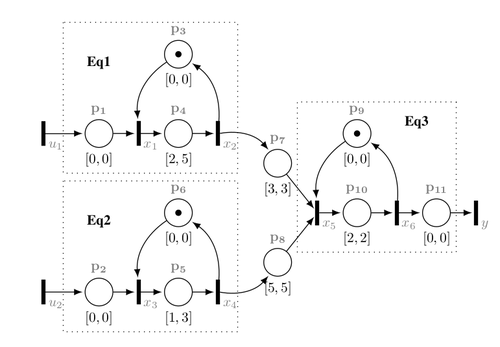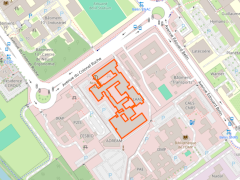Development of diagnostic algorithms
The synthesis of diagnosers (diagnostic algorithms) is based on the existence of a model, a stream of observations and an objective level based on the knowledge derived from the model. This level of objective can range from the estimation of states to the synthesis of an explanation for the appearance of a fault.
The synthesis of diagnosers (diagnostic algorithms) is based on the existence of a model, a stream of observations and an objective level based on the knowledge derived from the model. The basic objective is to estimate system states. One of the difficulties of this estimation is the management of different sources of uncertainty (interval/ellipsoid/zonotope type of set calculation, interval Kalman filter) in continuous [hal-01739540], [hal-01884592], [hal-01884636] and hybrid systems (reachability) [hal-01650701] and also incorporate sources of statistical uncertainty (interval Kalman filter [hal-01561951]). The second level of objective is the localization of faults in the system (where is the fault?). DISCO proposes localization techniques based on the implementation of CSP (constraint satisfaction problem) type problems in logic systems [hal-01929533], or by exploiting the residuation theory of the max,+ algebra on timed discrete-event systems [hal-01954270]. The third level of objective is fault identification. This diagnostic problem is tackled on all types of systems: diagnosis by model-checking on Petri nets [hal-01827362], non-linear observers [hal-01763870] or by using analytical redundant relations on continous/hybrid systems [hal-01229077], taking into account bounded and mixed incertainties [hal-01739540], distributed methods for diagnostics [hal-01229097]. DISCO is also working on the synthesis of fault-tolerant plans and controls [hal-01884700] or plans that aim at refining a previous diagnosis (active diagnostics) [hal-02056090]. The fourth and final level of objective is fault explanation, where we look for unanticipated behaviours (patterns, propagation of events) in the system that are the cause of the fault (explainable system behaviours, algorithm explainability).
FOCUS

State estimation, uncertainty management and fault tolerance
In the field of state estimation, DISCO is interested in the inverse problem for PDEs (identifiability of model parameters), which has led to the design and convergence proof of an original algorithm for effective parameter estimation. DISCO also studies different frameworks for representing incomplete or imprecise knowledge: distribution functions, possibility theory, belief function theory, interval analysis, and exploits them to define new algorithms based on Kalman interval filters for fault detection and isolation. DISCO also develops algorithms for optimizing experimental conditions to best estimate uncertain model parameters (in a bounded error context). DISCO is also developing systems for estimating the dynamics of autonomous vehicles and driver assistance systems, for implementing improved man-machine interaction in the intelligent vehicle of the future (observers), as well as fault-tolerant control and the reconfiguration of intensified processes.

Diagnosis in discrete-event systems
Discrete-event systems are a broad class of dynamic systems in which the change of state is represented by the occurrence of instantaneous events (computer protocols, communications networks, automated production lines, etc.). Among these systems, we distinguish between atemporal systems (time advances through the occurrence of events) and temporal systems (time is quantified). In the atemporal context, DISCO has been developing algorithms for this class of system for many years. More recently, DISCO has been developing algorithms for the diagnosis of complex behaviors deemed critical (patterns represented by Petri nets), exploiting model checking techniques. Based on these same techniques, DISCO proposes diagnostic methods that always return an unambiguous estimate of the system's state, using a system of preferences. In the temporal field, DISCO is studying extensions of its algorithms for pattern diagnosis, and is proposing a specific algorithm for the detection and localization of event and time shifts in timed event systems (such as automated production lines), exploiting (max,+)-linear (dioid) system theory.
Managing the distribution/decentralization of diagnostic systems
Distributed systems are collections of components that communicate with each other. To diagnose their state of health, they can be equipped with autonomous agents that perceive and communicate with their neighbors, so that the system's overall behavior appears unique and coherent. DISCO exploits this type of architecture in its proposed algorithms. In particular, the team has recently developed a structural approach to optimize the decentralized/distributed generation and/or selection of diagnostic tests in such systems.

Active diagnostics
Active diagnostics is the problem of acting on the system to bring out additional symptoms, thereby resolving existing ambiguities. DISCO develops methods based on the assumptions of active diagnosis, which are approached as a conditional planning problem (heuristic search in a state graph of type and/or). More specifically, a conditional plan may be a sequence of tests conditional on the measurement of these tests to locate the fault as quickly and cost-effectively as possible. This type of problem has been studied in particular in the automotive and space industries. A method for active diagnostics on continuous systems is also being studied, in which case the problem is seen as a control synthesis.












